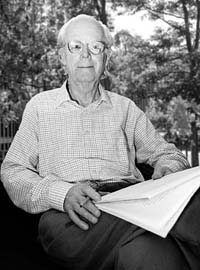|
|||||||
Bulletin
the University of Sussex newsletter
Sussex Biologist Scoops Crafoord Prize
Professor John Maynard Smith has been awarded the Crafoord Prize by the Swedish Academy of Sciences for his fundamental contribution to evolutionary biology. Widely recognised as the equivalent of the Nobel Prize, the Crafoord Prize is awarded annually to scientists working in fields not covered by the Nobel Foundation. John Maynard Smith is being honoured particularly for his revolutionary work on game theory. 
During a career in evolutionary biology spanning over fifty years, John has been credited with introducing the concept of 'game theory' to biology in the 1970s. Game theory was established within economics in the 1940s as a mathematical way of analysing situations where competition arises between individuals. Applying a concept born in economics to the subject of animal behaviour was a radical step, but game theory has now become "part of the toolkit of every field biologist," according to John. The inspiration to use game theory hit John when he observed animals' fighting patterns. "They may make a lot of fuss over the fight, but there is rarely much blood on the carpet. This suggests that the whole affair is very ritualised. Rituals can be mapped mathematically, and game theory is a way of doing that," he says. John is an advocate of the application of mathematics to biology, claiming that, "You can't be vague with mathematics, you have to be precise. The great thing about maths is that it forces you to say exactly what you mean." In game theory, the mathematical model comes before the empirical observation, creating an interchange similar to that between theoretical and experimental physics. Game theory is an abstract way of observing animal behaviour which is extremely precise but rarely immediately applicable. "You guess what the possible behaviours of animals might be in order to make abstract predictions. These predictions are very clear-cut, but they don't necessarily apply to a particular species," says John. Indeed, the process of transition from theory to observation can take time. The classic game 'Rock, Paper, Scissors' was used as a model in John's early experiments with game theory, and only many years later was it actually found to apply - to a species of lizard. John is delighted at being awarded the prestigious 1999 Crafoord Prize, saying "It is obviously a great honour." The ceremony will take place in Sweden in September, when he will be presented with a share of $500,000 and a gold medal. The prize will be awarded jointly to fellow biologists Ernst Mayr of Harvard and George C Williams of State University, New York, something which gives John particular pleasure. George Williams is a respected colleague, and Ernst Mayr is something of a mentor - John read his work as a student. Indeed, John is looking forward to the pleasure of getting together with two friends he respects and admires almost as much as he is to receiving his prize.
Friday 26th February 1999
|